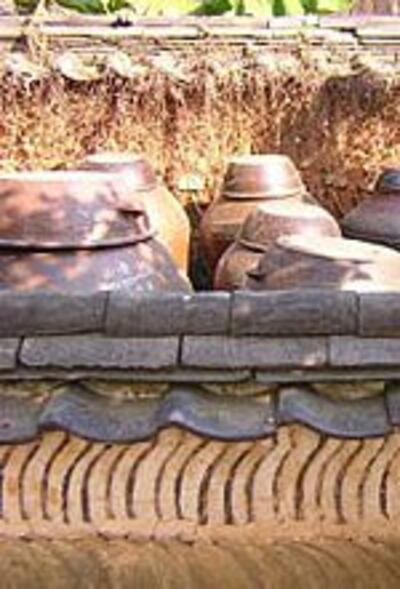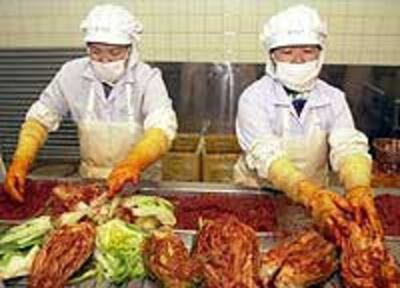
SEOUL—A public health threat, a trade war trigger between Seoul and Beijing, the food that sustains North Koreans through unimaginable hardships, or a cure for bird flu?
Kimchi—a spicy, fermented cabbage dish with a history of around 1,000 years, capable of conjuring strong feelings of patriotism and homesickness in Koreans the world over—is increasingly finding itself in the news these days.
First came a public health scare in South Korea, which imports around U.S.$40 million worth of cheap kimchi from China to meet demand in mom-and-pop restaurants and school canteens across the country.
The Korea Food and Drug Administration banned the sale of kimchi imported from China earlier this month, ordering all unsold products destroyed and a recall of sold merchandise.
Bilateral ties at stake
Everything Korean is as hot as kimchi in China now,
Quarantine officials said they had found three kinds of parasitic eggs in samples from nine of 16 brands of Chinese-made kimchi.
Then, similar parasites were found in a small proportion of domestically produced kimchi, too, leading to a back-to-basics craze for home-pickling.
This is done in special pots and exudes a pungent smell caused by cabbage or radish fermenting alongside garlic, ginger, and chili peppers.
“I’m very well aware of the concern raised about the safety of kimchi imported from China,” South Korean Foreign Minister Ban Ki-moon told reporters. “But it must not have a negative impact on Korea-China relations that have been making rapid progress in all areas.”
Koreans' attachment to kimchi, with all its cultural and emotional significance, came through in a recent interview by two North Korean defectors with RFA’s Korean service.
The pair now live in Seoul, after spending seven years in a scraped-out shelter high in the mountains of northeastern China.
Kimchi is hot, Korean is hotter
“We had to have some food stored for winter time. So we dried some vegetables and mushroom. We took some of the dried food to the town. Then, people gave us some kimchi out of pity,” defector Sung Kyung-il said, describing the grueling existence he eked out with his wife in hiding from the Chinese authorities.
“Kimchi was the food that I always craved,” Sung said.
New brides, mothers, and top restaurants all strive to produce the best possible kimchi to keep their relatives and customers coming back for more.

And a national South Korean newspaper—the Munhwa Ilbo—sponsors an Annual Kimchi Expo with International Kimchi Awards in three categories: kimchi-producing restaurants, kimchi-producing families, and individual kimchi chefs. This year's Expo is being held this month in the South Korean capital.
Chinese kimchi has turned South Korea into a net importer of kimchi—far from its dream of becoming a leading exporter of the pickled vegetable.
And the banning of Chinese imports has caused nationwide angst and soul-searching. Many restaurants simply cannot afford to do business if they are forced to sell expensive local kimchi.
Cure for bird flu?
To make matters worse, in a move widely viewed in Seoul as the first retaliatory shot in the kimchi wars, China has asked for stringent safety-standard documents for South Korean cosmetics.
Such a trade war is unlikely to go down well with Chinese consumers, however, who have been hooked on all things South Korean in recent months, a side-effect of imported soap operas.
"Everything Korean is as hot as kimchi in China now," Sheridan Prasso, a veteran Asia correspondent and author of The Asian Mystique, told Radio Free Asia by e-mail.
“Especially Korean men and hair ornaments. It’s due to a very popular serial drama that most young women watch on television, as well as Korean pop stars whose music is popular with Chinese teeny boppers,” she said.
Boosting kimchi’s credentials at a time of doubt and conflict have been comments from highly respected scientists who say that the pungent Korean pickle may have some effect on bird flu, a highly virulent and fatal avian influenza virus spreading around the world.
Professor Kang Sa-ouk of Seoul National University said in an interview that South Korea had already begun to sell an extract of kimchi to treat outbreaks of flu in poultry overseas.
“Our research team is currently studying on whether there’s any material in kimchi itself to treat this bird flu, and, if any, how it fights the virus,” Kang said.
“We don’t know exactly whether the kimchi lactobacillus itself is killing the virus or strengthening cells, thus preventing the bird flu virus from moving forward. What is certain at this point is that when we feed kimchi lactobacillus to bird-flu infected chickens, they are cured,” he said.
The product, marketed as Leucocide, was already finding a strong market response around the world, the professor said.
Meanwhile, the 2005 Annual Kimchi Expo kicks off the the South Korean capital this month, working to promote the expansion of the kimchi market for “approximately 400 Korean kimchi producers, foreign buyers from over twenty countries, and some half a million kimchi lovers all over the world,” a statement on the exhibition’s Web site said.
“Special exhibitions will provide information on all aspects of kimchi, from its history, preparation, various regional varieties, and nutritional content, to scientific evidence of its health benefits, traditional and modern storage containers, and the present state of the kimchi industry,” it said.
Original reporting in Korean by M.H.Jang, in Mandarin by Liu Shui, and by RFA’s Cantonese service. Cantonese service director: Shiny Li. Korean service director: Jaehoon Ahn. Mandarin service director: Jennifer Chou. Written for the Web in English by Luisetta Mudie and edited by Sarah Jackson-Han.
